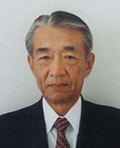Message from the Past Presidents (3rd President, 2009-13)
Message from the President
Message from the Past Presidents (3rd President, 2009-13)

Towards Development of JABEE
Dr. Tsutomu KIMURA
I have been taking office as the President since June 2009 succeeding Dr. Hideo OHASHI.
A decade has passed since the establishment of JABEE. Having been involved in its establishment myself, I have an honest feeling that JABEE has really come a long way. When we were making desperate efforts to establish an accreditation institution for engineering education in Japan, there were voices saying it would be too early to establish such an institution. There was no doubt that from international point of view Japan had to urgently establish an accreditation institution for engineering education. With such thoughts, JABEE was started off in November 1999. I would like to take this opportunity to express my sincere gratitude to the founder President, Dr. Hiroyuki YOSHIKAWA and immediate past President, Dr. Hideo OHASHI and others who have led JABEE.
JABEE became a signatory member of the Washington Accord in 2005 and obtained an international status. Since JABEE started accreditation in 2001, 409 engineering programs from 158 educational institutions have been accredited, and graduates from JABEE accredited programs have exceeded 95,000 as in 2008. I expect that number of JABEE accredited programs would increase further. However, one of our concerns is that only small numbers of applications have been made by traditional universities with long history.
In United States, many traditional universities with long history such as MIT support ABET’s fundamental principle that is “ABET is striving not only to improve quality of the engineering education in the United States but also raise the level of engineering education in the world”. Many traditional universities with long history have applied since ABET was established. Recently, the accreditation system in different field of profession in the United States has become a focus of criticism from various sectors. There is high possibility that core part of accreditation or evaluation system might change drastically in no distant future. We should take a close look at its direction. It is not too much to say that engineering education determines ups and downs of each nation. World Bank is going to invest 1 billion US Dollars to India based on the request of the government in next 10 years in order to raise the level of engineering education. I have been requested to participate in its feasibility study. I am very excited to know that people in India are very eager to learn Japanese experiences. The presence of Japanese engineering education is highly recognized worldwide. Although Japanese engineering education faces various problems, it is no exaggeration to say that engineering education has contributed enormously in building the current Japanese position as 2nd biggest industrial country in the world. In order for Japan to formulate true knowledge-based society, further evolution in engineering education is required. JABEE has set it as a major goal and we have been working very hard. I would highly appreciate it if academicians and leaders of industry could cooperate with us and support us.
Apart from discipline-based accreditation, the institutional evaluation of universities was introduced in Japan in 2004. The scheme was initiated as the result of a proposal by the Central Council for Education that the country of Japan should create universities with strong identities under the competitive environment. The institutional evaluation will certainly serve to raise the quality of Japanese universities as a whole but not necessarily function to create competitive environment. As can be seen from the example of UK, discipline-based accreditation or evaluation is much more effective in building up the competitive environment. In fact the Central Council for Education has been seriously discussing the possibility of introducing discipline-based accreditation or evaluation system. My personal view is that such system will be introduced in the higher education sector in Japan before long. JABEE is no doubt the strong candidate as a certified accreditation or evaluation institution in the field of engineering. In preparation for this, JABEE will make every effort for further improvement.
JABEE has currently applied to the Ministry of Education, Culture, Sports, Science & Technology for being a certified accreditation institution for professional graduate schools from academic year of 2010. I strongly believe that it will make JABEE move up to a higher stage and give a higher social status.
This post is also available in:  日本語
日本語

